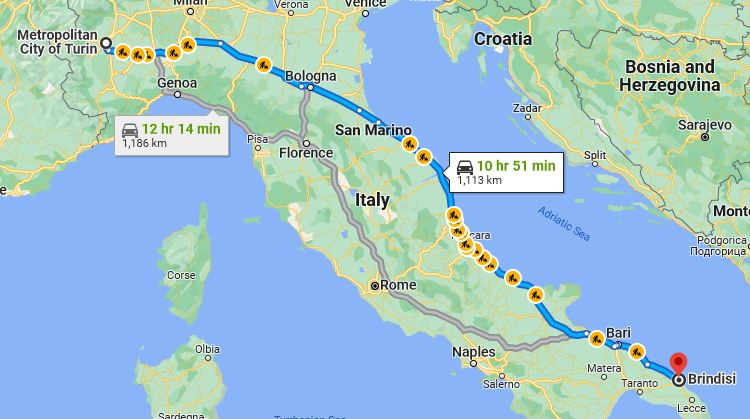We’re continuing our blog-trip Around the World in Eighty Days, 150 years after its publication. Today, we’re in Brindisi after riding with Phileas Fogg and Passepartout by train from Turin.

We’ve covered 1420 miles to this point, already 5.8% of the total planned distance. Yet only 3.8% of our 80 days have elapsed. All looks well.
As with the earlier cities on the tour, Verne neglected to describe Brindisi. Perhaps he could count on his French readers being familiar with it.
Brindisi sits at the high heel of the Italian boot, near the joining of the Adriatic Sea with the Mediterranean. In 1872, 13,800 people lived there. Only two years before, the Peninsular & Oriental Steam Navigation Company (P&O) added Brindisi to its route, coinciding with the opening of the Brindisi Marittima railway station.
After leaving the train station, Fogg and his servant would have taken a carriage to the port to board the steamship Mongolia. That ship would take them through the Suez Canal to Bombay (now Mumbai). No fictional creation of Verne, the Mongolia existed. Built in 1865, it displaced almost 3000 tons and, according to Verne, its engines produced 500 horsepower.
The Mongolia got scrapped in 1888, but P&O later built two more ships by that name.
If you visit Brindisi now, you’ll find it’s home to 87,000 people. That Brindisi Marittima railway station closed in 2006, replaced by a car park.

Getting from Turin to Brindisi today doesn’t require a train ride of 32 hours and 40 minutes, like Fogg had to endure. Just hop a 3 ½ hour flight, which includes a 1-hour layover in Rome.
If you’re wondering what it would be like to fly around the world today, stopping at the major cities of Phileas Fogg’s route, I recommend the book 80 Hours. It’s sold at Rakuten Kobo, Scribd, Tolino, Vivlio, Amazon, Apple Books, and Barnes & Noble.
The voyage to Suez will take four days, so look for the next post in this series on October 9. They’re about to remove the gangway on the Mongolia. Fogg and Passepartout are already aboard, waiting for you and—
Poseidon’s Scribe

